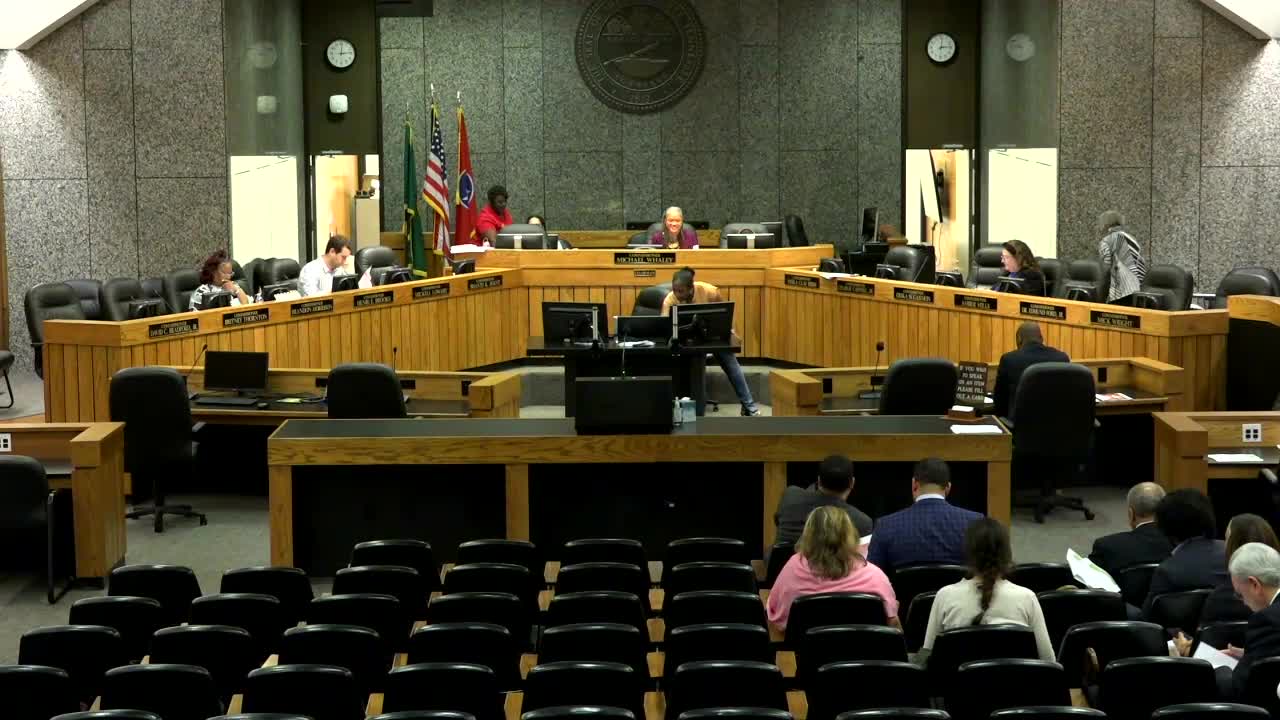Shelby County ad hoc committee hears competing cases for pilot reform and for preserving housing pilots
Get AI-powered insights, summaries, and transcripts
Subscribe
Summary
A joint working session of the Shelby County Board of Commissioners ad hoc committee on payments in lieu of taxes (PILOTs) on Oct. 26 heard competing arguments over whether to tighten or pause local PILOT programs — with county and municipal officials, the Memphis Health Education and Housing Facility Board and housing partners offering sharply different views on risk, transparency and housing production.
A joint working session of the Shelby County Board of Commissioners'ad hoc committee on payments in lieu of taxes (PILOTs) on Oct. 26 pulled together municipal industrial development boards, the Downtown Memphis Commission, the Memphis Health Education and Housing Facility Board and the Memphis Housing Authority to discuss whether the county should pursue reform, carve-outs or a moratorium on PILOT agreements.
The most immediate contention centered on housing pilots administered by the Health, Education and Housing Facility Board (HEHFB). Critics on the committee pressed for stronger transparency, standard public records and clearer compliance monitoring. HEHFB attorneys and housing partners said a moratorium would halt projects that rely on PILOTs to close financing and produce affordable units.
"I don't think there's been any pilot reform across my career," Shelby County Mayor Lee Harris said, stressing that county practice normally respects municipal decisions. Harris said mayors and the commission can set policy parameters for PILOTs, and that he receives notice and sometimes signs an approval letter when a municipality seeks a corresponding county reduction. "The role of the commission, as I see it, would be to set the policy parameters in general for all pilots," Harris said. He added he would be reluctant to act unilaterally to change longstanding processes but said the commission could propose changes.
Representatives of the Memphis HEHFB told the committee their board operates under a different state statute than the industrial development boards the committee is examining and urged the committee not to apply a blanket moratorium to HEHFB-managed housing pilots. Attorney Charles Carpenter said HEHFB transactions use recorded quitclaim deeds, leases and pilot agreements that legally freeze improvement assessments rather than simply "giving money" to developers. Carpenter said the board's projects have produced thousands of rental units and rely on a capital stack of tax credits, bond financing and grants.
Carpenter told the committee HEHFB is focused on multifamily affordable housing and estimated "about 44,000 units" are needed in Memphis and Shelby County to meet demand. Corbin Carpenter, HEHFB general counsel, said the board's public record files and recorded instruments are available through the register of deeds and that the agency has policies, tenant-benefit requirements and compliance processes that have evolved since a 2018 delegation of authority.
Members of the committee, including Trustee Regina Newman and Dr. Austin T. Harrison of Rhodes College, pressed HEHFB and other PILOT-granting entities for clearer, centralized access to applications, underwriting and compliance records. Dr. Harrison and others flagged recent compliance failures in some privately managed properties and asked how boards verify that developer promises translate into tenant benefits and property improvements.
Downtown Memphis Commission Executive Director Shandell Ryan argued that PILOTs in the core city generate increased long-term tax revenue by activating underused property. Ryan said DMC performs underwriting, turns away applicants that do not meet its financial test and includes clawback language in development agreements. "Every time we issue a pilot, it always ends up in increased tax revenues," she said, adding that a moratorium would create investor uncertainty and delay projects.
Memphis Housing Authority CEO Dexter Washington described recent MHA partnerships that used PILOTs to make deep-affordability senior housing and large redevelopment projects feasible. Washington said MHA projects such as the South City redevelopment and Edgeview at Legends Park required PILOT-supported debt service coverage and other subsidies; without the PILOT reductions, he said, several projects would not meet lender underwriting and would be infeasible.
Municipal IDB representatives from Bartlett, Arlington, Collierville and Germantown described local pilot policies and compliance practices. Bartlett said it follows EDGE policies under an interlocal agreement and has used pilots to support medical device and manufacturing investment. Arlington said it applies a stricter scoring matrix and higher wage tests than the county minimum. Collierville and Germantown said they use quantitative matrices, annual compliance reporting and reserve the right to third-party audits; Germantown described an on-site third-party audit that led to a reduction in a pilot term.
Committee members repeatedly requested: (1) a single, searchable repository or clearer guidance about where applications and recorded pilot instruments live; (2) written examples of the mayor's "sign-off" paperwork; and (3) a clearer, shared definition of the "but-for" underwriting that boards use to justify incentives. HEHFB and DMC representatives said they would cooperate with the committee and provide additional documents and follow-up briefings.
No policy changes or votes were taken at the session. Committee Chair Commissioner Janice Banks said the ad hoc effort will continue as a "coalition of the willing" to explore reforms such as modest reductions in abatement percentages, education carve-outs, standardized transparency measures and shared compliance protocols. Several speakers suggested the politically realistic path to change would be incremental: a small reduction in abated percentage, or a dedicated carve-out so property tax dollars earmarked for education remain unaffected by PILOTs.
The session emphasized the trade-offs municipal and county leaders weigh: using PILOTs to enable affordable housing and redevelopment in weak markets versus preserving tax revenue for schools and services. HEHFB and housing partners warned that sweeping, immediate moratoria would put planned affordable developments at risk, while advocates for reform urged clearer public oversight and measurable tenant protections.
The committee asked staff to gather the requested records and for PILOT-granting bodies to return with specific application, underwriting and compliance materials. Several presenters agreed to meet again with the committee to refine a set of transparency and monitoring recommendations.
